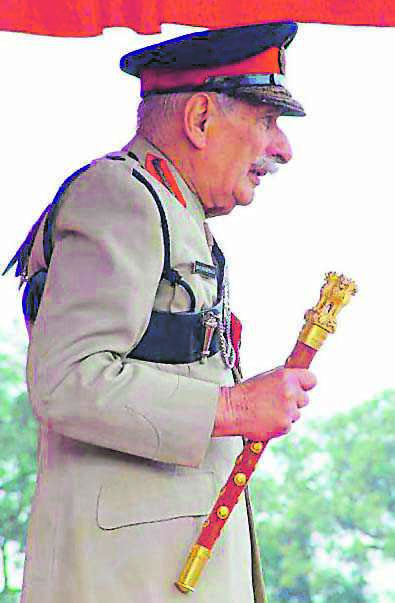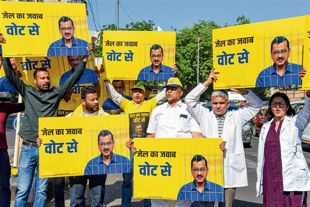
Soldiering with dignity. Sam Hormusji Framji Jamshedji Manekshaw
Hugh & Colleen Gantzer
IT was our Armed Forces' finest hour. It changed the map of the subcontinent, gave birth to a new country and was, arguably, the most superbly planned and executed military campaign in the history of modern warfare. It also established precedences in civil-military ties that are now being eroded. The relationship between a civilian administration and its military establishment is often strained. This is an existential problem. In the Services the chain of command is clear, as are its objectives: compromise is not an option.
In civilian life the socio-political matrix is in a constant state of flux, particularly in India. We have 1,600 political parties drawn from 4,365 communities. It's bad enough for the administrator, torn between principle and pragmatic pandering to the pressures of politicians. It's worse for our netas who have the additional stress of a five-year shelf life. Lifetime faujis would be ridiculed by their peers if they celebrated two years of service to the nation with fanfare and razzmatazz.
Significantly, however, no political party celebrated the birth centenary of Sam Hormusji Framji Jamshedji Manekshaw. Though he had strategised India's greatest military victory, the politicians were unhappy with him. He had refused to toe their line. But then, Sam had never been scared of defying public opinion. And proving it wrong. As a light-eyed, slim, young officer Sam was posted to a battalion which had a mix of burly Sikhs and Pashtoons. On day he heard them remarking "Oi kurri nu platoon commander bana ditta. Hun ki kariye!" (What shall we do now that a girl has been made our platoon commander!) Sam bided his time. When he saw that a star athlete of the platoon could not clear a four-foot bar, he did a short run and sailed over it. Then he turned to his men and said "Tusi kiho jaye athlete ho! Aina ucha te kudyian wi tap jandiyan ne" (What kind of athletes are you? Even girls can easily jump over this bar!) His men didn't know that Sam had been born in Amritsar and spoke fluent Punjabi.
Officers and men in the Services live in close proximity, 24x7, unlike their political colleagues who parachute down, pontificate from high pulpits, don't respond to comments, and then vanish into their ivory towers! Incidents like these showed the mettle of a man who once, in Burma, took a burst of LMG fire that lodged nine bullets in his stomach and perforated his lungs, liver, kidneys and intestines. He was saved by his men who, when ordered to leave all casualties behind because they would delay withdrawal, refused to do so. In fact, they threatened to shoot the military doctor if he did not attend to their "revered leader". Before Sam recovered, he was awarded the Military Cross.
It is difficult for a bureaucrat or a politician to appreciate the depth of such earned loyalty. In the perception of many servicemen, the fawning fealty purchased by their civilian counterparts tends to give their recipients an inflated sense of their own importance. Secretaries of all ilks are particularly prone to this. The system of file notings is designed both to diffuse responsibility and accrue authority by eroding that of others. When the Defence Secretary signed a file noting asking Sam for an explanation, the Chief's reply was succinct: “”. The dence secretary is but a medium between the Defence Minister and the Chief of Army Staff. It is not his prerogative to ask the Army Chief questions."Embarrassed that his attempt at bossing the Chief had been foiled, the bureaucrat came running to Sam's office asking him to withdraw his comment but Manekshaw stuck to his guns and his rebuttal remained on the file.
Sam's greatest defiance of authority came when he refused to toe the line of Mrs Indira Gandhi's Cabinet. In April 1971, panicked by the unending flow of refugees from a tortured East Pakistan, the beleaguered government wanted to attack Pakistan. Manekshaw said it was a flawed decision. According to Brigadier Behram M. Panthaki (retd) and his wife Zenobia, authors of Field Marshal Sam Manekshaw, The Man and His Times, (Niyogi Books), the Chief "..needed time to mobilise formations… ensuring adequate logistical support. This would entail requisitioning trains ..crops were ready to be harvested in the Punjab and the diversion of rolling stock would result in food shortages… additional roads would need to be built by the Border Roads Organisation …any operation in summer spelt disaster with the entire delta region in West Bengal turning into a vast swamp with the monsoon rains….IAF support would be restricted because of poor visibility. Any entry into East Pakistan would be suicidal until the rivers had ebbed and the snow had blocked any chance of the Chinese opening up a Third Front along the northern border… The Army had just eleven tanks in operational condition out of 189; requisitions for purchase were pending with the Ministry of Finance." It is curious how politicians and bureaucrats accept, without demur, opinions of callow MBBS doctors about matters of health but question service officers when it comes to advice on their specialisation, defence, involving the life and death of thousands of their fellow citizens.
The Prime Minister dismissed her Cabinet, reversed its inexpert and hurried decision to attack East Pakistan, and followed Manekshaw's sane advice,
On December 3, 1971, the Pakistan Air Force attacked 11 Indian airfields on the Western Front. India and Pakistan went to war for the third time. On December 16, 1971, in Dacca's Ramna Racecourse, 92,000 officers and men of the Pakistan Army surrendered to Lt. Gen Jagit Singh Aurora, GOC-in-C of our Eastern Command. The Panthakis create a vivid vignette of what happened in Parliament then:
“On the day Dacca fell, Mrs. Gandhi could barely contain her excitement. She ran up the stairs of Parliament House and interrupted proceedings to announce victory. Pakistan had been trounced in less than two weeks against a projected time frame of four to six weeks. The House exploded with jubilation. It was India's finest hour.”
In January 1973, General Sam Manekshaw was promoted to Field Marshal for his brilliant planning and execution of the 1971 war. It had given birth to Bangladesh and also done much to redeem the Army of the stigma of the Himalayan debacle of 1962. At that time a compliant Army Chief had accepted the knee-jerk decision of the politicians and thrown unprepared and ill-equipped soldiers into battle, treating our officers and jawans like cannon fodder.
India's first Field Marshal's baton was rightly awarded to the man who knew when it was his duty to say "No!"
The authors are Mussoorie-based travel writers.



























